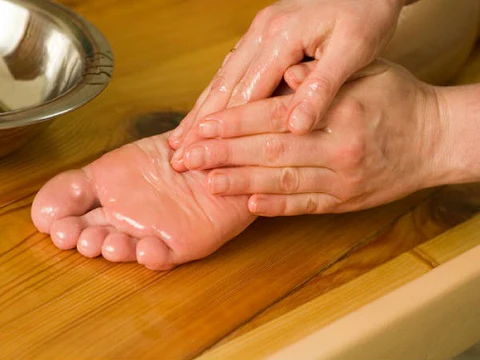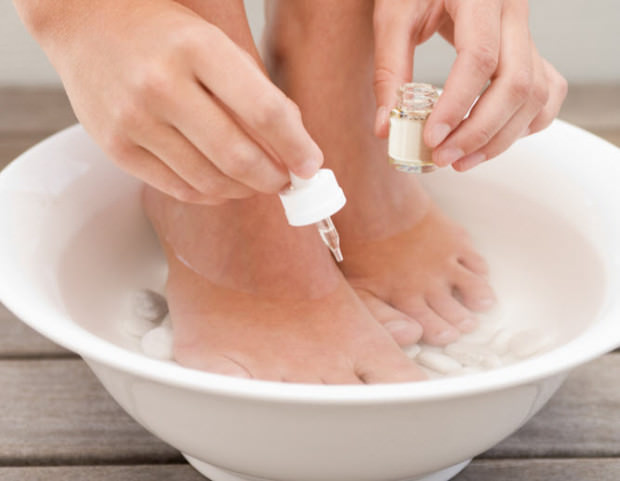This article is for you if you’re looking for a natural remedy to treat bunions without surgery. If you’re dealing with the discomfort and pain of bunions, fear of undergoing surgery. As someone who has personally experienced bunion pain, I have found success in using essential oils as a natural remedy.
Are you tired of dealing with painful bunions? Want a non-invasive solution that actually works? This article is for you! Hey there! If you’re reading this, chances are you or someone you know is struggling with the pesky problem of bunions. Trust me, I’ve been there too and it’s not fun. But don’t worry, I’m here to share my personal experience and expertise on how essential oils can provide relief from bunion pain. So let’s dive in and discover the power of nature in treating those troublesome bumps on your feet!
So, bunions and essential oils?
Using essential oils can be an effective natural remedy for bunions. Bunions are a common foot condition in which the big toe joint becomes enlarged and painful due to pressure and misalignment. They can cause discomfort and make it difficult to walk or wear certain shoes.
Essential oils have anti-inflammatory properties that can help reduce swelling and pain associated with bunions. Some of the best essential oils for treating bunions include peppermint, lavender, eucalyptus, and tea tree oil.
To use essential oils for bunion relief, mix a few drops of your chosen oil with a carrier oil such as coconut or almond oil. Gently massage the mixture onto the affected area several times a day to help alleviate pain and inflammation.
In addition to providing relief from symptoms, using essential oils regularly may also help prevent further progression of bunions by promoting better circulation in the feet.
It is important to note that while essential oils can provide relief for bunion discomfort, they should not be used as a substitute for medical treatment if your condition is severe or causing significant pain. It’s always best to consult with a healthcare professional before trying any new remedies or treatments.
Understanding Bunions: Causes, Symptoms and Traditional Treatments
Bunions are those bony bumps that form at the base of your big toe, and they can be quite uncomfortable. This condition usually arises from an imbalance in the way you walk or issues with your foot structure, which might be influenced by genetics. When your toes push against each other, it causes pressure on the joint and leads to that characteristic bump. A few common culprits include wearing tight shoes, high heels, or even certain types of arthritis. If you’re experiencing redness or swelling around this area, you may have a bunion forming.
When it comes to treating bunions traditionally, there are several options available to help ease pain and discomfort. Wearing wider shoes is often recommended since they provide more room for your toes to move freely. Additionally, using custom orthotics can stabilize your foot’s position while offering extra cushioning where it’s needed most. Over-the-counter medications such as ibuprofen can also reduce inflammation and pain levels effectively. In some cases where bunions become severe and affect mobility significantly, surgical procedures may be considered to realign the toe properly and alleviate discomfort long term.
In summary, understanding what causes bunions helps you take preventive steps early on—making informed choices about footwear could save a lot of trouble later!

Exploring the Power of Essential Oils: Their Benefits and Uses
Essential oils have a captivating allure, drawing people in with their delightful aromas and potential benefits. These concentrated plant extracts are not just fragrant; they carry the essence of nature’s bounty within tiny bottles. For centuries, various cultures across the globe have harnessed these oils for their therapeutic properties. From lavender, known for its calming effects, to peppermint, celebrated for its invigorating scent, each oil has unique characteristics that can enhance our well-being in different ways. The method of extraction often involves steam distillation or cold pressing, ensuring that all the beneficial compounds remain intact.
Using essential oils is as simple as it is enjoyable. They can be incorporated into daily routines through methods such as aromatherapy diffusers or topical applications when diluted properly with carrier oils like coconut or jojoba oil. Some popular uses include:
- Relaxation: Inhaling lavender before bedtime may promote better sleep.
- Mood enhancement: Citrus scents like orange can uplift spirits and energize.
- Pain relief: Eucalyptus may soothe headaches when applied gently.
Incorporating essential oils into your life invites a world where nature’s healing touch meets everyday convenience, creating moments of tranquility and joy amid life’s hustle and bustle.
Read also: miracle broth for cancer patients
Essential Oils for Bunion Treatment: How They Work and Which Ones are Best
Bunions can be quite uncomfortable and may lead to pain in the feet. Many people are turning toward natural remedies, such as essential oils, to help ease this discomfort. Essential oils work by penetrating the skin and providing relief through their soothing properties. They often possess anti-inflammatory qualities that can help reduce swelling around a bunion, making it easier for you to walk and enjoy daily activities. Some oils also have analgesic effects, meaning they can minimize pain when applied topically or inhaled.
When considering which essential oils might be best for bunion treatment, a few stand out due to their unique benefits:
- Lavender: Known for its calming scent, lavender oil also helps reduce inflammation.
- Peppermint: This oil has a cooling effect that can relieve pain and enhance circulation.
- Eucalyptus: Its anti-inflammatory properties make it effective in soothing swollen areas.
To use these oils effectively, simply mix them with a carrier oil like coconut or jojoba oil before applying them gently over the affected area. Remember to perform a patch test first to ensure there’s no allergic reaction!
Managing Bunion Pain with Essential Oils – A Natural Alternative to Surgery
When it comes to alleviating bunion pain, many people are exploring natural remedies that can provide relief without the need for surgery. Essential oils, known for their aromatic and healing properties, have gained popularity as a gentle way to manage discomfort. For instance, peppermint oil is often praised for its cooling effect and ability to reduce inflammation. When diluted with a carrier oil like coconut or olive oil, it becomes an easy topical treatment. Simply massage the mixture onto the affected area daily; this may help soothe both pain and swelling.
Another effective option is lavender essential oil, renowned not only for its calming fragrance but also for its anti-inflammatory benefits. Adding a few drops of lavender oil into warm water creates a relaxing foot soak that can ease tension in the feet while reducing soreness around the bunion. Additionally, incorporating soothing oils like chamomile or tea tree into your routine might enhance overall comfort by promoting better circulation and reducing redness in the skin surrounding the bunion.
Ultimately, while these essential oils are not substitutes for medical advice or treatment, they offer promising avenues of support when managing bunion pain naturally and gently.
